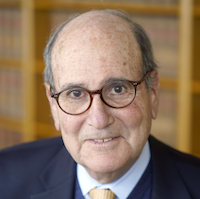
Born and raised in Philadelphia, PA; received A.B. from the University of Michigan in 1967, [majoring in political science] and J.D. from NYU School of Law in 1970. Book Review Editor of NYU Journal of International Law & Politics.
Staff attorney for the New York City Commission on Human Rights and Manhattan Legal Services [in Spanish Harlem] 1971-1972. Moved to Berkshire County, Massachusetts in 1972 to become the attorney-in-charge of Legal Aid Society of Albany’s Rensselaer County Office in Troy from 1972 to 1974.
Maintained general practice law firm in Stockbridge and Lenox, Massachusetts from 1972 to 1984 [individually, and as partner in Rutberg & Shearn, 1975 to 1980; Rutberg & Heller 1984-1994]. Clients included: Red Lion Inn, Country Curtains, Inc., Berkshire Corporation, the Rose family enterprises, Berkshire Theatre Festival, Inc.
Appointed as Associate Justice of the Southern Berkshire District Court in March 1994, and named Presiding Justice of the Pittsfield District Court in January 2007 as well as Presiding Justice of Southern Berkshire District Court in November 2013. Appointed to the District Court Appellate Division in 1998 and served until 2010; Appointed as Chair of the District Court Committee on Civil Proceedings in 1998 and served until 2011; appointed to the Supreme Judicial Court’s Standing Advisory Committee on the Rules of Civil Procedure in 2001 and appointed as its Chair in September 2008, served as Chair through April 2015. Member of Board of Directors [2006-2010], and a Vice President of the Massachusetts Judges’ Conference [2008 to 2010]. Retired from the bench on April 21, 2015.
On May 2, 2016, along with 3 other investors [Stan Lipsey, Hans Morris, and Bob Wilmers] purchased New England Newspapers, Inc., which publishes The Berkshire Eagle and 3 Vermont newspapers [The Bennington Banner, The Brattleboro Reformer and the Manchester Journal]. President of New England Newspapers, Inc. from May 2, 2016 to date; Publisher of New England Newspapers, Inc. from December 3, 2017 to date.








